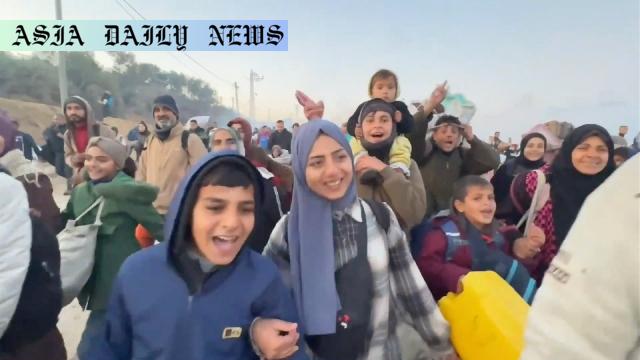Palestinians are heading back to their homes in northern Gaza, after Israel on Monday lifted restrictions on their access to the area.
Israel has lifted restrictions on Palestinians returning to northern Gaza.
Hamas plans to release three more hostages by the month’s end.
Since the ceasefire, Hamas has released 7 female hostages while Israel freed 290 Palestinian prisoners.
US President Trump suggested residents could be taken in by Jordan or Egypt, which both nations rejected.
The Palestinian Authority emphasized such proposals violate longstanding warnings concerning displacement.

Palestinians Return to Northern Gaza
Recent developments in the Israel-Palestine situation have seen Palestinians returning to their homes in northern Gaza. On Monday, Israel lifted restrictions that had prevented access to the area, allowing many families and individuals to head back. Aerial footage captures the poignant sight of crowds moving northward along a seaside road, a testament to both resilience and hope for a future of stability.
Hostage Releases Signal Progress
The decision to lift restrictions coincides with notable steps taken by Hamas, which announced the planned release of three more hostages, including a civilian woman. This follows a broader trend of exchanges since the January 19 ceasefire between the two sides. To date, Hamas has released seven female hostages, and Israel has reciprocated with the release of 290 Palestinian prisoners. Such gestures, though fraught with political implications, point towards an effort to build trust, albeit tentatively.
Bigger Diplomatic Concerns
At an international level, the situation has elicited responses from key players. U.S. President Donald Trump recently suggested that Gaza residents seek relocation to neighboring nations, namely Jordan and Egypt. However, these nations firmly opposed the suggestion, with Jordanian Foreign Minister Ayman Safadi reiterating the principle of national sovereignty: “Jordan is for Jordanians and Palestine is for the Palestinians.” Egypt’s government echoed a similar sentiment, underlining that the lack of resolution of Palestinian rights contributes to regional instability.
Palestinian Authority’s Firm Stance
The Palestinian Authority has taken a strong position against any plans or suggestions that may lead to displacement. Calling such ideas a “blatant violation,” the authority stressed adherence to established red lines. This highlights the sensitivity of rights and sovereignty in the ongoing conflict and international mediation attempts.
Hope Amid Persistent Challenges
The return of Palestinians to their homes is a small yet significant victory in a region long plagued by displacement and conflict. However, the broader challenges of unresolved territorial disputes, political differences, and humanitarian crises remain critical. Still, the ceasefire, prisoner exchanges, and international dialogue signal a cautious optimism for steps towards stability, even as the road ahead is uncertain.



Commentary
A Moment for Reflection
The sight of Palestinians returning to their homes in northern Gaza is a moving moment that underscores both resilience and the human cost of the enduring conflict. While the lifts on restrictions and exchanges of prisoners between Israel and Hamas deserve recognition, they also highlight the complexities and ongoing challenges in achieving peace and stability in the region.
Contextualizing the Hostage Releases
The release of hostages and the lifting of restrictions are undoubtedly steps forward, but they point to the transactional nature of negotiations in this long-standing conflict. Such moves, while meaningful to those directly impacted, often fail to address the deep-seated issues that fuel distrust and violence on both sides. The international community must consider not just immediate gains but the broader framework for sustainable peace.
The Role of International Actors
The response by nations like Jordan and Egypt to U.S. President Donald Trump’s suggestions of resettlement for Palestinians brings to focus a crucial difference in perspective. While some nations look for quick fixes to complex situations, others recognize the need to uphold national and cultural integrity. This dynamic could play a pivotal role in shaping future dialogues and negotiations.
The Path Forward
Though small wins such as the return of residents to northern Gaza are cause for cautious celebration, lasting solutions will require immense diplomatic efforts, commitment to human rights, and a willingness to engage in sincere dialogue. International actors and local leaders alike must prioritize the restoration of dignity, freedom, and equity for all parties involved. This moment, while significant, is a reminder of the journey still ahead.